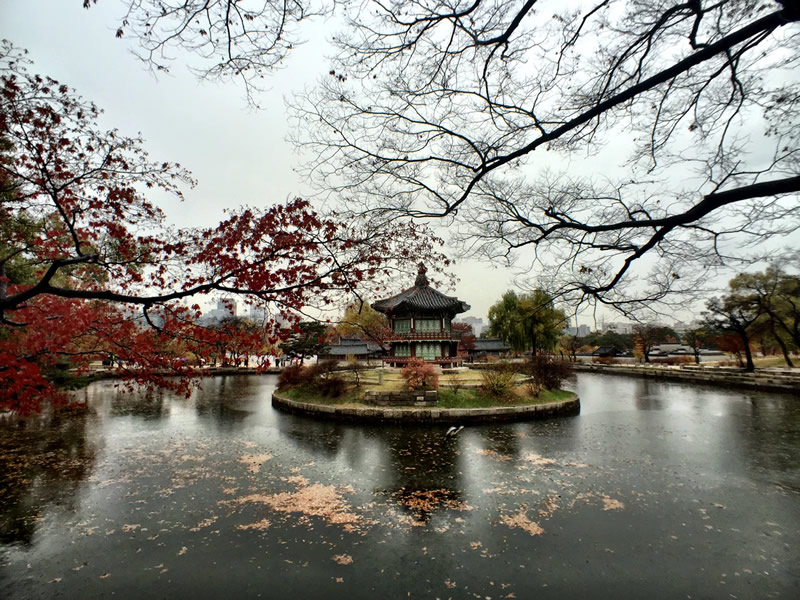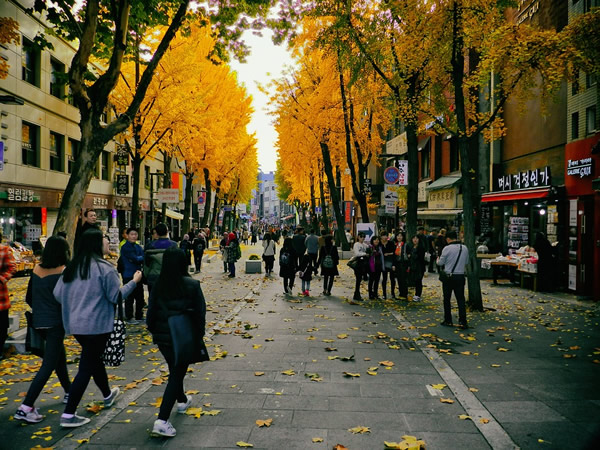The Joys of Living and Teaching in South Korea
By Molly Kennedy
Resources updated 11/21/2023 by Transitions Abroad

|
|
Buddhist temple island in a lake in South Korea.
|
During the summer after college I temporarily employed myself by teaching English to foreign students around my university. Many of them were South Koreans who came over to study business or English. They were all incredibly warm and friendly, often inviting me over for dinner after a lesson. They spoke warmly of South Korea, and all mentioned that there was a high demand for English teachers in Asia.
I did a bit of research and found that they were right; it would be fairly easy to get a job teaching English with nothing more than a B.A. Furthermore, schools generally paid for airfare and housing in addition to an annual salary. I applied to a number of Korean universities and got lucky. Within a few months, I was hired by a South Korean University, the second-best school in the country. I wasn't a full-fledged professor: I would teach half adults and college students and half children. Still, my teaching schedule would be only 25 hours a week, which would give me plenty of time to explore the city and country.
Life in the Land of Morning Calm
Every morning I wake up to the sound of bells coming from the Buddhist temple down the hill. As I brush my teeth, I hear the sound of yodelers on the mountain above. I wind my way to town through the local fruit, vegetable, and fish vendors. When I buy my morning pastry (carefully avoiding the dried squid laid out next to it), the elderly shopkeeper smiles and bows with a komapsumnida (thank you very much).
Seoul is certainly an international city, with a population of 14 million, and nearly everything western can be found if you need it. But it's far more interesting to stick to the quintessentially Korean — eating on the floor of a local restaurant, slurping up noodle soup with chopsticks, or crooning away old 80s tunes with friends at a local noorebong, which is a small karaoke room.
On the weekends, there is the chance to visit Seoul's many ancient palaces and pagodas. If you're feeling more energetic, you might stroll around the buzzing local markets, with vendors selling everything from cooked pigs' heads to clothes with slogans such as "Ape shall never kill ape."
When city life gets too stressful, you can head to a jimjilbong, which is a sort of sauna and bathhouse open 24 hours. Being the conservative American that I am, I at first had trouble getting used to walking around in rooms full of nude women bathing, watching television, chatting, and being scrubbed down by other nude women. But I soon started to enjoy the fountains of hot water flowing into polished marble tubs, the sauna rooms with Chinese herbs to promote health, the iced fruit to cool off, and even the naked scrub massages.
The main attraction of Korea, however, is its people. Koreans are remarkably friendly. Since foreigners are still relatively rare, especially outside of Seoul, they tend to get special treatment. Upon seeing a waygoogin (a foreigner), Koreans will often come up simply to chat and ask how you like their country. They may give you free Korean sweets, offer to show you around the area, or even invite you to their homes. One Korean friend here has been giving me Korean language lessons for the last two months — she still refuses payment and, what's more, often treats me to lunch afterwards.

|
|
A street in Seoul.
|
Because South Korea is a small country, and because its transport system is so efficient and cheap, it's easy to see virtually the entire country by taking weekend trips. And since many Koreans speak some English, traveling is fairly easy. In four months, I have seen pagodas more than 1,000 years old, eaten still-squirming octopi from fresh fish markets, been pulled into circles of dancing drummers in the rain, been given an impromptu lesson in traditional Chinese brush painting, seen a monk playing a bamboo flute inside a mountaintop pagoda, walked through the longest lava tunnel in the world, visited the DMZ a month before an international shoot-out, and prayed with Buddhist monks as the sun rose on an island temple in the west.
While my salary is still a small teacher's salary, my housing is paid for; I don't have to pay U.S. taxes; and the cost of living here is cheaper. I've found that I can easily save money while doing all of this. Travel in neighboring countries is also cheaper, since things like hotels and meals are often the equivalent of $5 to $10 per day. For my five weeks of vacation, I backpacked through Thailand, Cambodia, Vietnam, and Laos.
How to Teach Abroad in South Korea?

|
|
A library in Seoul.
|
For those readers who think this sounds like a great idea, here are some basic guidelines: Teaching jobs in South Korea are a dime a dozen; you could easily apply online and have three to four offers within a day. However, finding a good job takes time and effort. Anyone who has lived and worked in Asia will tell you that it's worth doing the extra research before coming over. Otherwise, you may end find yourself teaching 50 screaming kindergarteners for nine hours a day, living in a leaky basement, and, worst of all, not getting paid.
Why are jobs so easy to find? Basically because so many Koreans are fanatical about English education (and education in general). Getting into a good college is wholly dependent on a child's high school and test performances, a significant part of which is focused on English. After university, many jobs in Korea require a high score on an English language test, such as the TOEFL, or English proficiency, since world business is so often conducted in English. Because of this, students of all ages often attend private, after-school academies called hagwans.
There are generally two types of ESL teaching jobs in South Korea: those in regular schools (elementary, high school, or university), which are harder to get, and those in hagwons. University jobs often require a master's degree, though not necessarily in English education. Hagwons generally require only a B.A.
However, be careful; some hagwons are untrustworthy and may give horrible hours, horrible pay, horrible accommodation, or all three. To make sure you're working for a respectable organization, it's best to ask for the email addresses of former teachers to ask them about the school and to check the terms of the contract before signing — including such details as the size of the apartment, the times you work, the number of hours you work, and the amount of vacation time you have. Make sure everything is in writing before you sign. Once you arrive, stick to your terms and never give up your passport to a school owner! (Some unscrupulous ones have been known to keep teachers' passports as bargaining leverage.)
You may also want to check up on a websites such as Eslcafe.com, which is devoted to English teaching abroad, and provides a forum on teaching English in Korea. On chat boards such as these, you can put up a posting and see if anyone knows of the school or the area you'll be teaching in.
While there are possible pitfalls, those who take precautions and do their research may find that teaching abroad is a life-changing experience. I've met expats of every age and background who took time out of their lives for a year or two of adventure, and found that they enjoyed it so much that they stayed for six or seven. In that time, many have saved enough to buy a house back home or to build a nice retirement cushion. Me? I plan to squander my savings backpacking around until I use my last dollar to pay for a rickshaw to the airport.
MOLLY KENNEDY taught English in Seoul.
|
